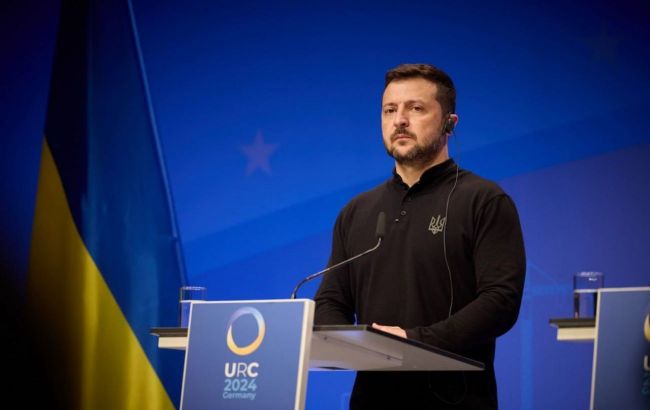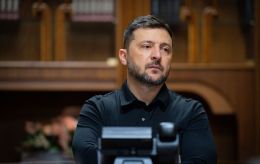Investments and enhanced air defense: Initial outcomes of Ukraine Recovery Conference
 Photo: Volodymyr Zelenskyy at a conference in Berlin (president.gov.ua)
Photo: Volodymyr Zelenskyy at a conference in Berlin (president.gov.ua)
The first day of the International Ukraine Recovery Conference took place in Berlin, Germany. Its aim is to consolidate support for meeting urgent needs, implementing rapid projects, and creating attractive conditions for business and private investments.
RBC-Ukraine summarizes the outcomes of the first day of the Ukraine Recovery Conference 2024.
Contents:
- Nearly a hundred projects worth $27 billion
- Germany: declaration on recovery and more
- European Commission: First €1.5 billion from frozen Russian assets
- Italy: two aid packages, including military
- European Investment Bank: €100 million for social infrastructure
- Council of Europe Development Bank: €100 million for housing compensation
- What else Zelenskyy said in Berlin
Nearly a hundred projects worth $27 billion
During the conference in Berlin, an investment guide was presented, containing information for investors, experts, and analysts interested in Ukraine's recovery.
The guide identifies sectors prioritized by the government and focuses on the development of manufacturing to address gaps in export logistics and increase value-added.
The document provides a detailed overview of key sectors such as energy, transportation and logistics, agro-industrial complex, green metallurgy, pharmaceuticals and medicine, critical materials, IT, along with examples of projects in these sectors.
Overall, the investment guide includes 95 projects totaling approximately $27 billion. Many of them require refinement, for which the launch of the Project Preparation Facility is being prepared to increase the number of ready projects for further financing.
As stated by First Deputy Prime Minister and Minister of Economy Yulia Svyrydenko, to catch up with EU countries in terms of GDP per capita, Ukraine needs investments or technology transfer amounting to $10-30 billion per year over the next decade.
Following the conference, Ukraine hopes for agreements worth billions. During the opening, President Volodymyr Zelenskyy announced that hundreds of recovery agreements are already being prepared at the government, community, and corporate levels.
"From this conference, we will emerge with agreements worth billions of euros, for our defense - for the production of military equipment and weapons in Ukraine; for our energy sector - for the repair and development of new and more modern energy sources; and for our social life - this includes education, housing construction, and the supply of medical equipment," he added.
Germany: declaration on recovery and more
The Ministries of Finance of Ukraine and Germany have signed a declaration to strengthen bilateral cooperation. German Minister Christian Lindner emphasized that Berlin will not limit itself to the support needed to win the war alone.
"We want to contribute now so that Ukraine can set the course for future growth through its reconstruction," he said.
This involves not only financial resources but also creating potential to support private companies, promoting investments, and reforming the Enterprise Development Fund. The Ukrainian party hopes that the agreement will provide a new impetus to cooperation with Germany and strengthen institutional capacities.
It was announced recently that Germany will provide over 30 million euros in concessional loans for Ukrainian energy. Today, Chancellor Olaf Scholz spoke about Ukraine's enormous potential.
"We are talking about rebuilding a country that is a future EU member. A few months after the start of the Russian invasion, together we made a promise about a future for Ukraine in the EU. We are sticking to this promise," he noted.
Additionally, Scholz announced that the European Commission will establish a fund of its own capital for further assistance to Ukraine. He also promised to provide weapons necessary for defense in the near future.
"We will supply Ukraine with the third Patriot air defense system, IRIS-T systems, Gepard, missiles, and ammunition. All of this will be sent to Ukraine in the coming months and weeks," he added, stressing the necessity to protect the country and critical assets from the Russian attacks.
European Commission: First €1.5 billion from frozen Russian assets
In May, the European Commission approved a plan to transfer proceeds from frozen Russian assets to Ukraine. It was reported that 90% of the proceeds would be directed to the European Peace Fund for arms supplies.
Today, President of the European Commission Ursula von der Leyen announced that the first tranche will be allocated this summer.
"About €1.5 billion of windfall revenue will be available as early as July," she said at the conference.
Furthermore, under the Ukraine Facility program, an additional €1.9 billion will be provided as early as June.
Italy: two aid packages, including military
As stated by the Minister of Foreign Affairs of Italy, Antonio Tajani, the priority in Ukraine's recovery should focus on protecting infrastructure with modern air defense systems.
"And that's why I want to inform you that Italy is ready to send a new military package with SAMP/T for the air defense of Ukraine," Tajani said.
The SAMP/T surface-to-air missile system is capable of intercepting ballistic missiles, like Patriot systems, transferred by other allies. Currently, their quantity is insufficient to cover the main critical objects from Russian attacks.
Moreover, Italy is ready to provide not only military assistance but also to help in other areas. The second package worth €140 million is aimed at measures on infrastructure, railways, healthcare, agriculture, humanitarian sector, and demining.
European Investment Bank: €100 million for social infrastructure
As part of the conference, a financial agreement was reached with the European Investment Bank (EIB). The goal is to restore and modernize essential social services in areas such as education, healthcare, housing for internally displaced persons, and social infrastructure, as well as the restoration of facilities in destroyed territories and modernization in regions heavily affected by the conflict.
The recovery program will receive €100 million.
Currently, the portfolio volume of joint projects is the highest in Ukraine's cooperation with the EIB, exceeding €7 billion. Since the start of the full-scale war, the bank has invested over €2 billion.
Council of Europe Development Bank: €100 million for housing compensation
The Ministry of Finance has signed an agreement with the Council of Europe Development Bank for a €100 million loan as part of the "HOME. Compensation for Destroyed Housing" project.
This project will be implemented across all Ukrainian-controlled territories. The funds will be directed towards housing certificates, through which Ukrainians will receive compensation for housing destroyed due to hostilities and Russian shelling.
The damages to the housing sector are estimated at $50 billion. The bank's head, Carlo Monticelli, emphasized that this agreement is just the beginning. The financial institution is ready to support long-term social development, recovery, and reconstruction in Ukraine.
It is anticipated that Ukrainians will be able to submit requests and receive housing certificates after verification by a special commission. The progress of case reviews can be tracked in the Diia application.
What else Zelenskyy said in Berlin
Energy
Speaking to partners, President Zelenskyy stated that the spring campaign of Russian strikes destroyed 9 GW of capacity, whereas the peak consumption last winter was 18 GW. Ukraine has lost significantly more generation capacity than what is consumed by major cities. 80% of thermal and one-third of hydro generation have been destroyed.
Ukraine has all the natural foundations for modern energy. However, it will not be able to realize this potential without loans and investments.
"In the short term, we also must implement a rapid and cost-effective restoration of all the power facilities that can be restored now. By winter, it is important to do this by winter – within the next three to four months. We know how to do it. We are asking you to provide us with the equipment from your shutdown power plants and direct financial assistance... And another element is highly efficient, decentralized, mobile gas generation... We have a clear plan – how to build up to 1 GW of capacity this year.," Zelenskyy noted.
Working hands are needed now
Global recovery of Ukraine will happen after the end of the war with Russia, but working hands are needed now.
"After the war is over, I am sure that everyone will come to rebuild our country. There will be jobs, there will be safety, and I believe there will be great motivation," said the President.
He believes that Ukrainian refugees should not be forced to return while the war is ongoing. However, those who want to help Ukraine could return and participate in the reconstruction.
"There are areas that need work today. There are people who left without homes. They need help, they need working hands. These professions are needed. We have lost many people who lost their jobs due to the war, and some have gone abroad," he emphasized.
About the war with Russia
If Ukrainians want to preserve their state, they must be ready to defend it. According to him, there are questions in society regarding mobilization, but the war has been ongoing for some time, and mobilization will continue.
Zelenskyy stressed that just a year or two before the fall of the Berlin Wall, no one could have imagined how quickly it would happen. It depended on the leadership of politicians and the will of the people. Therefore, it may seem to some now that Vladimir Putin is there forever and the war will never end.
"But this is not true, all this is an illusion. An illusion that can be dispelled by leadership... Do we have any other goal than peace? No. Do we have any other continental dream than a peaceful Europe? No. Do we have any other duty than to protect our nations, our Europe and the rules-based international order? No," he added.
According to him, the war with Russia will end on clear Ukrainian terms. It will not be left as a legacy to future generations.
Sources: statements by President of Ukraine Volodymyr Zelenskyy, German Chancellor Olaf Scholz, Italian Foreign Minister Antonio Tajani, and news on the websites of the Ministry of Economy and the Ministry of Finance.

